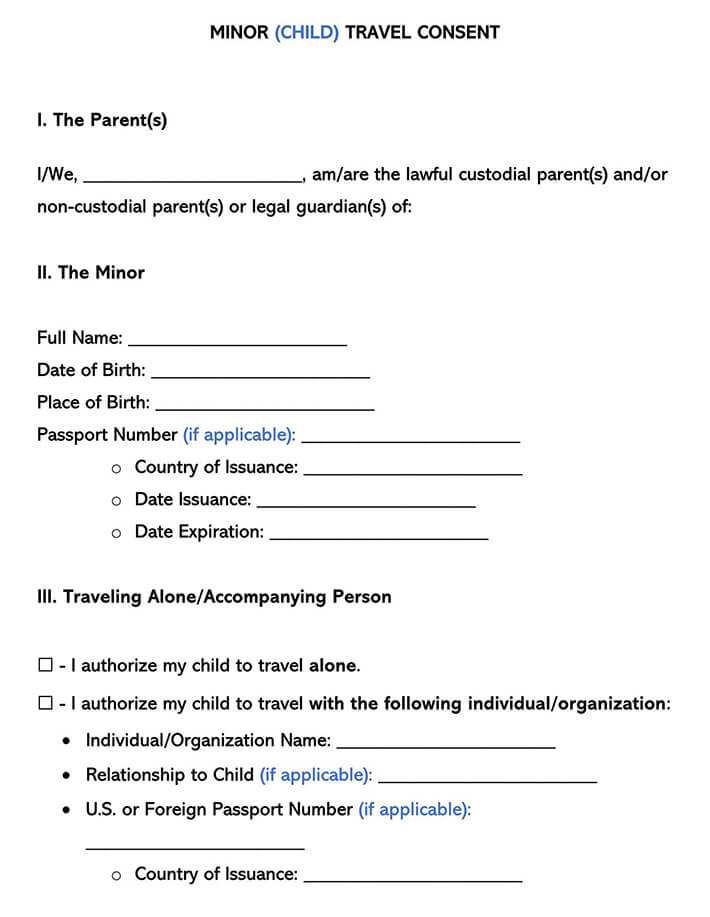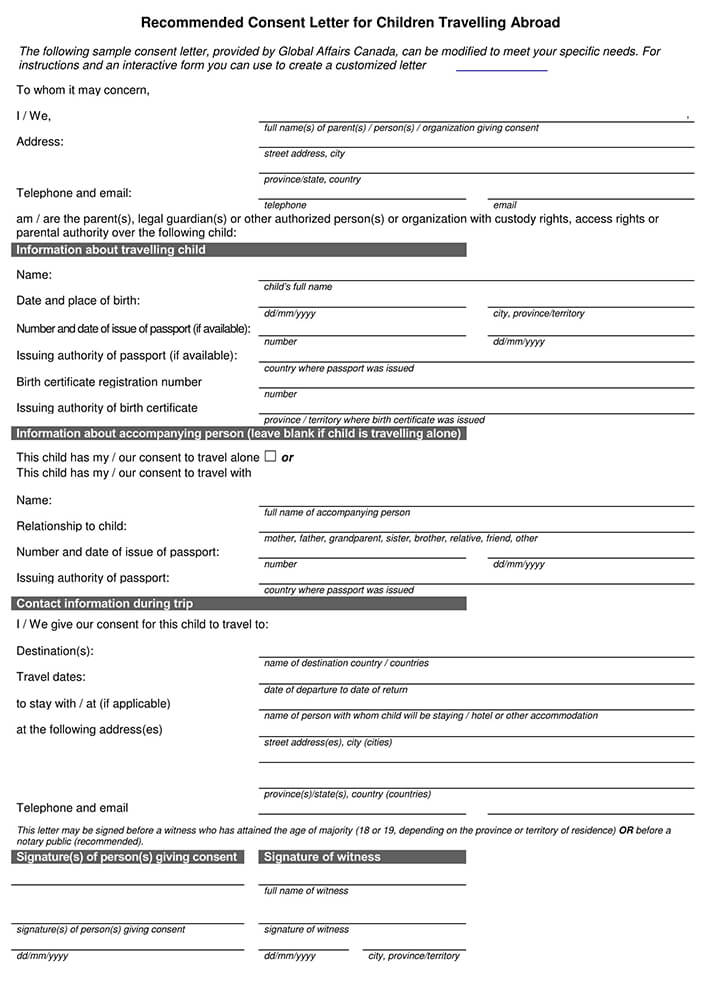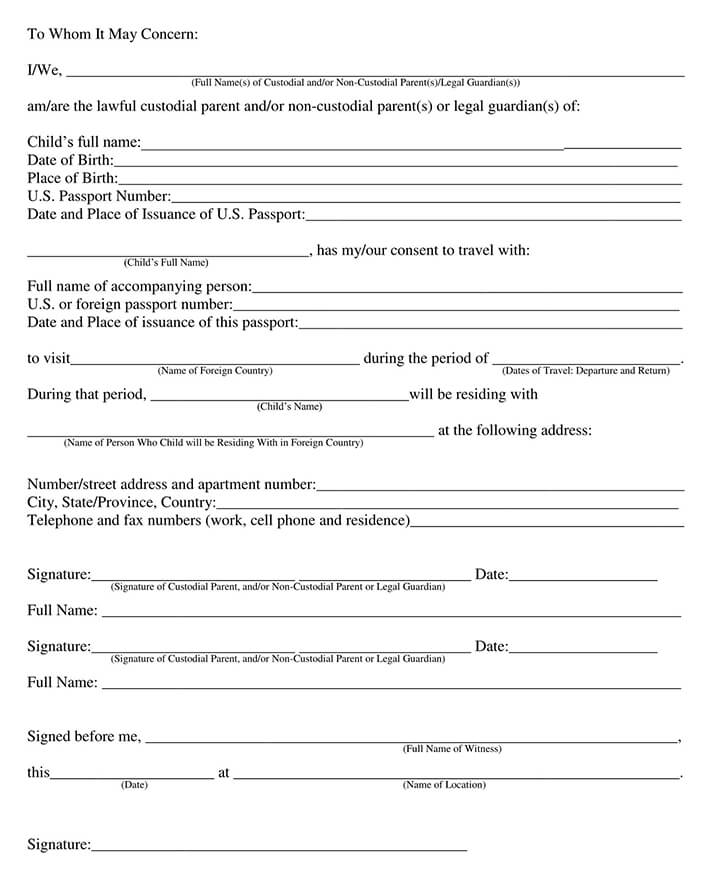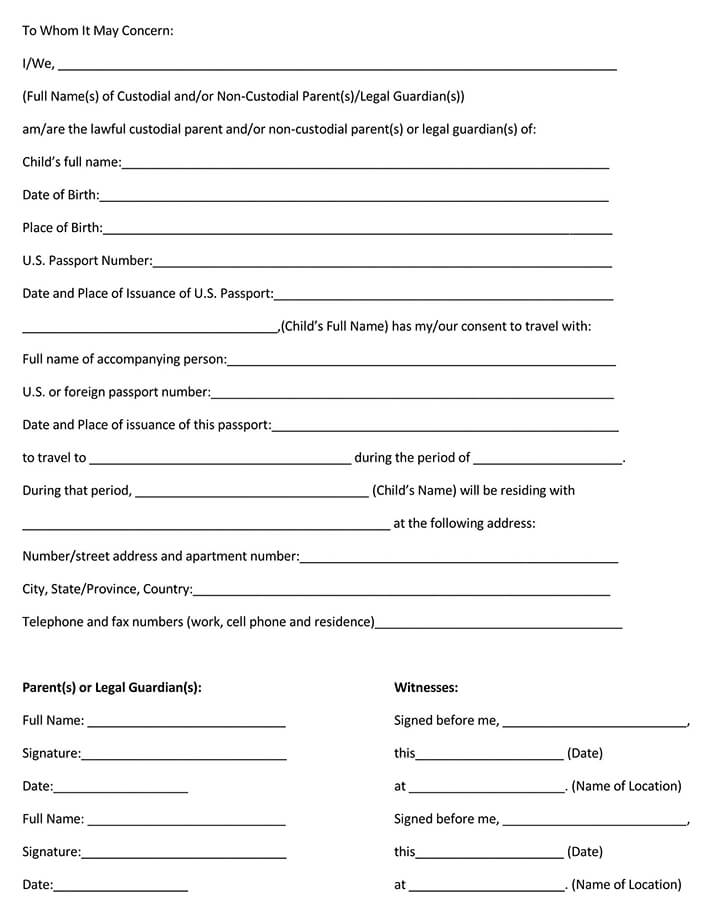If you’re a parent or guardian who travels a lot, or you’re usually not around, you would need to give consent to the caregiver who would take care of your child while you’re away. Also, if your child plays sports or is going on a trip and you would want an adult supervisor to be able to make healthcare-related decisions for your child, you will need a minor consent form.
A Minor Medical Consent Form is a legal document that you’re required to sign as a parent or guardian. This form gives a caregiver or someone else the right to access healthcare or make healthcare-related decisions for your child on your behalf.
You might see such a form referred to under different names such as:
- Caregiver medical consent form
- Medical authorization for a minor
- Emergency medical consent form
- Authorization to consent to medical treatment
- Parental medical consent form
- Child medical release form
- Consent to treat minor children
Free Consent Form




How to Give the Consent for a Minor
There are different ways to give consent to a caregiver, for them to make medical decisions for a minor on your behalf.
Given below is a complete step-by-step guide on how you can give medical consent for your minor:
Medical consent is used where the parent or guardian is not available, and a caregiver would have to be with the child. A very important part of giving it is the presence of an authorized caretaker. As a parent transferring consent to administer care to your child, you need to find a competent caretaker with whom you can safely leave the duty of making decisions for your child and have a contract with them explaining all the conditions.
Step 2: Choose a proper medium to give consent
You can choose to give medical consent by writing a letter. The easiest way, however, is to give consent to a caregiver by utilizing a fill-able form template, especially if you’re from a non-legal background. In some states, instead of a basic form, a guardian would be required to grant a power of attorney for a minor. If your state does not require such, then a form is enough to give a caregiver the right to take care of your minor.
This form ensures that certain boxes are ticked. Items like the child’s medical history and the details you would want your caregiver to provide are all communicated with the form. Where a form is not used, and the child is informally passed to a caregiver, important information like this could be missed, leading to other health complications for the child.
- Inform the caretaker of the minor’s medical issues: The caretaker’s responsibility of providing medical care for your child would require them to be fully aware of all possible issues that the child might have already. As a parent or guardian, you should make sure that the caretaker has all the details of history. By doing this, you’re helping the caretaker make the best possible decisions for your child.
- Give details of the child’s medications: If your child is going to be on medication while you’re away, ensure the caregiver is fully aware of all the medications. This would help them administer the medication when it is due and your child would continue taking them rightly, even in your absence.
Step 3: Specify the ending date of the consent
A minor medical consent only grants temporary authorization to the caregiver. When you’re entering the agreement with the caregiver, you need to make sure they are aware of when the consent would expire.
In some states, it lasts for six to twelve months. Formally, if guardianship lasts for longer this period it would be with permanent or recurring consent, and for this to be valid, it has to be approved by a court.
Step 4: Give the consent
Once you have checked all these boxes, you can then formally transfer your consent to allow the caretaker to provide medical care for your child. Your consent is formally given when you assent to the content of the form or letter by signing it. Once you’ve signed the form, you have given your consent and the caretaker has received the right to provide healthcare to your minor.
What Should be Included?
When giving the consent, there are certain things you must take note of as they must be present for the consent form or letter to be valid.
These include the following:
Details of the authorized caretaker
The form should have the details of the authorized caregiver who is being granted the consent to provide medical care to the minor. In some cases, their legal name might be sufficient, whereas, in some, the parties might feel that more is required. It should also capture the caretaker’s address on a valid I.D card for identity. Generally, it is mandatory that the authorized caregiver is identifiable from the form or letter.
Name of the minor
The name of the child for whom the consent is being given must be explicitly stated. If this consent would apply to more than one child, their names should be explicitly mentioned. Their legal name, home address, and date of birth are usually sufficient information for giving consent. The date of birth should be as it is on the child’s birth certificate. If the birth certificate is not available, such as where the child is with a legal guardian, you can get the information from a court where the information has been recorded before.
Parents’ personal information
The parent’s personal information must also be clearly stated. Parents here refer to both or either parent. It also includes any guardian who has the right to grant consent for the care of the child to another person.
Medical history of the minor
You should also provide the child’s history when giving consent to the caregiver. This would guide the authorized caregiver while administering healthcare to the child.
The history required to give consent includes the following information:
- Health conditions: This includes any pre-existing health conditions that affect the child’s day-to-day living or affect the type of medication that would be administered to the child. Some health conditions are asthma and diabetes. If a child has any such pre-existing conditions, it has to be stated with the child’s medical history.
- Allergies: You should also provide information regarding any allergies that make your child react negatively. Food, medicine, or antibiotics that your child is allergic to should be documented to guide the authorized caregiver while providing care for the child.
- Prescription of medications: You should also provide the prescription for any medication your child is presently on to the caregiver. This would help them administer the medication the right way and at the right time.
- Vaccination history: The minor’s vaccination history is also important information that should be included for the caregiver to access quickly and easily.
Description of the treatments
In the medical consent, you should also explicitly highlight the treatments that the authorized caregiver would have permission to treat.
An ideal consent should allow the caretaker to make decisions for the child when it concerns emergency medical treatment, anesthesia and other surgical procedures, and transportation for emergencies.
Also, medical processes like diagnostic imaging, applying medication or prescriptions for the minor, and blood transfusions should be within the caregiver’s right to provide the treatment for the child. In addition, the caregiver should be able to provide care during routine activities like dental treatment and medical check-ups.
Additional details to be included
Asides from the details mentioned above; such as the child’s history and details, the parent’s personal information, and the caregiver’s personal information and identity, there are some other items that should be included.
- Risks involved: A medical consent should also contain possible health risks that administering healthcare might entail. Any common risks that could arise from the caregiver administering health care to your child should be highlighted here. This would absolve the caregiver of responsibility where those risks arise from the procedure and not from their own negligence.
EXAMPLE
Some common risks that could come with invasive procedures or surgeries are paralysis, bleeding, infections or injury to other areas of the body. When these procedures are going to be administered to your minor, the risks involved should be included in the consent form or letter.
- Assurances: When giving the consent, you should also include assurances that you, as a parent or guardian, have the capacity to give consent. Here, you guarantee that you’re legally capable of making the authorization for the care of the child.
- Minor’s best interests are the highest priority: It should also state that the best interest and health of the child are of the highest priority in making and fulfilling the agreement. This is why the agreement was created in the first place.
- Financial responsibility: The consent form or letter should include who would pay for the costs incurred while providing care for the minor. This would be the parents or guardians, or it might be covered under the child’s health insurance.
- Governing law: The governing law of the state regarding the provision of medical services is also important and should be highlighted when giving consent to a minor.
- Religious and moral beliefs: Parents or guardians should communicate to the authorized caregiver any religious or moral beliefs that they would like to be followed while care is being administered to the child.
- Health insurance details: The child’s health insurance details should also be provided when giving the consent. This would allow the caregiver to access it and use it where the details have to be presented in order to access medical care for the minor.
- Preferred hospital: Many parents have a preferred hospital they would like their child to be treated. If you have any such hospital, ensure that it is communicated to the caregiver who is being authorized to make decisions for a minor.
- Preferred physician or doctor: Similar to the preferred hospital information, parents or guardians should provide the name and details of any particular doctor they would like to treat their children.
The time frame of effectiveness
Medical consent has a temporary effect because it can’t last forever. Therefore, you should clearly state the period for which the caregiver is being given the consent to make decisions for a minor on your behalf. Stating this makes the agreement easier for all parties and prevents legal disputes from arising from the agreement in the future. However, if you want to give it permanently, you will need the court’s approval.
Authorization statement
In every consent document, be it a form or a letter, there is the authorization statement that signifies the grant of authority from the parent or guardian to the caregiver. In this section of the document, you would state who the caregiver is and that you’re consenting to i.e., allowing them to administer healthcare to your child temporarily. You would also state the child’s name or children affected.
Signatures
Signatures are the official stamp of authority for giving consent. They signify the interest of the parents or guardians in consenting to give the authority to another person. Both the consent form and the letter should be signed in front of a witness or third party who would also sign as proof of witnessing it.
Sometimes, however, just having any person as a witness is not enough. It would then have to be signed in the presence of a notary public. This is required for some hospitals to see it as being valid. Notaries can usually be seen at courts, your county clerk’s office, or at large banks.
How to Give the Consent for a Minor
There are different ways to give consent to a caregiver, for them to make medical decisions for a minor on your behalf.
Given below is a complete step-by-step guide on how you can give medical consent for your minor:
Medical consent is used where the parent or guardian is not available, and a caregiver would have to be with the child. A very important part of giving it is the presence of an authorized caretaker. As a parent transferring consent to administer care to your child, you need to find a competent caretaker with whom you can safely leave the duty of making decisions for your child and have a contract with them explaining all the conditions.
Step 2: Choose a proper medium to give consent
You can choose to give medical consent by writing a letter. The easiest way, however, is to give consent to a caregiver by utilizing a fill-able form template, especially if you’re from a non-legal background. In some states, instead of a basic form, a guardian would be required to grant a power of attorney for a minor. If your state does not require such, then a form is enough to give a caregiver the right to take care of your minor.
This form ensures that certain boxes are ticked. Items like the child’s medical history and the details you would want your caregiver to provide are all communicated with the form. Where a form is not used, and the child is informally passed to a caregiver, important information like this could be missed, leading to other health complications for the child.
- Inform the caretaker of the minor’s medical issues: The caretaker’s responsibility of providing medical care for your child would require them to be fully aware of all possible issues that the child might have already. As a parent or guardian, you should make sure that the caretaker has all the details of history. By doing this, you’re helping the caretaker make the best possible decisions for your child.
- Give details of the child’s medications: If your child is going to be on medication while you’re away, ensure the caregiver is fully aware of all the medications. This would help them administer the medication when it is due and your child would continue taking them rightly, even in your absence.
Step 3: Specify the ending date of the consent
A minor medical consent only grants temporary authorization to the caregiver. When you’re entering the agreement with the caregiver, you need to make sure they are aware of when the consent would expire.
In some states, it lasts for six to twelve months. Formally, if guardianship lasts for longer this period it would be with permanent or recurring consent, and for this to be valid, it has to be approved by a court.
Step 4: Give the consent
Once you have checked all these boxes, you can then formally transfer your consent to allow the caretaker to provide medical care for your child. Your consent is formally given when you assent to the content of the form or letter by signing it. Once you’ve signed the form, you have given your consent and the caretaker has received the right to provide healthcare to your minor.
What Should be Included?
When giving the consent, there are certain things you must take note of as they must be present for the consent form or letter to be valid.
These include the following:
Details of the authorized caretaker
The form should have the details of the authorized caregiver who is being granted the consent to provide medical care to the minor. In some cases, their legal name might be sufficient, whereas, in some, the parties might feel that more is required. It should also capture the caretaker’s address on a valid I.D card for identity. Generally, it is mandatory that the authorized caregiver is identifiable from the form or letter.
Name of the minor
The name of the child for whom the consent is being given must be explicitly stated. If this consent would apply to more than one child, their names should be explicitly mentioned. Their legal name, home address, and date of birth are usually sufficient information for giving consent. The date of birth should be as it is on the child’s birth certificate. If the birth certificate is not available, such as where the child is with a legal guardian, you can get the information from a court where the information has been recorded before.
Parents’ personal information
The parent’s personal information must also be clearly stated. Parents here refer to both or either parent. It also includes any guardian who has the right to grant consent for the care of the child to another person.
Medical history of the minor
You should also provide the child’s history when giving consent to the caregiver. This would guide the authorized caregiver while administering healthcare to the child. The history required to give consent includes the following information:
- Health conditions: This includes any pre-existing health conditions that affect the child’s day-to-day living or affect the type of medication that would be administered to the child. Some health conditions are asthma and diabetes. If a child has any such pre-existing conditions, it has to be stated with the child’s medical history.
- Allergies: You should also provide information regarding any allergies that make your child react negatively. Food, medicine, or antibiotics that your child is allergic to should be documented to guide the authorized caregiver while providing care for the child.
- Prescription of medications: You should also provide the prescription for any medication your child is presently on to the caregiver. This would help them administer the medication the right way and at the right time.
- Vaccination history: The minor’s vaccination history is also important information that should be included for the caregiver to access quickly and easily.
Description of the treatments
In the medical consent, you should also explicitly highlight the treatments that the authorized caregiver would have permission to treat.
An ideal consent should allow the caretaker to make decisions for the child when it concerns emergency medical treatment, anesthesia and other surgical procedures, and transportation for emergencies.
Also, medical processes like diagnostic imaging, applying medication or prescriptions for the minor, and blood transfusions should be within the caregiver’s right to provide the treatment for the child. In addition, the caregiver should be able to provide care during routine activities like dental treatment and medical check-ups.
Additional details to be included
Asides from the details mentioned above; such as the child’s history and details, the parent’s personal information, and the caregiver’s personal information and identity, there are some other items that should be included.
- Risks involved: A medical consent should also contain possible health risks that administering healthcare might entail. Any common risks that could arise from the caregiver administering health care to your child should be highlighted here. This would absolve the caregiver of responsibility where those risks arise from the procedure and not from their own negligence.
EXAMPLE
Some common risks that could come with invasive procedures or surgeries are paralysis, bleeding, infections or injury to other areas of the body. When these procedures are going to be administered to your minor, the risks involved should be included in the consent form or letter.
- Assurances: When giving the consent, you should also include assurances that you, as a parent or guardian, have the capacity to give consent. Here, you guarantee that you’re legally capable of making the authorization for the care of the child.
- Minor’s best interests are the highest priority: It should also state that the best interest and health of the child are of the highest priority in making and fulfilling the agreement. This is why the agreement was created in the first place.
- Financial responsibility: The consent form or letter should include who would pay for the costs incurred while providing care for the minor. This would be the parents or guardians, or it might be covered under the child’s health insurance.
- Governing law: The governing law of the state regarding the provision of medical services is also important and should be highlighted when giving consent to a minor.
- Religious and moral beliefs: Parents or guardians should communicate to the authorized caregiver any religious or moral beliefs that they would like to be followed while care is being administered to the child.
- Health insurance details: The child’s health insurance details should also be provided when giving the consent. This would allow the caregiver to access it and use it where the details have to be presented in order to access medical care for the minor.
- Preferred hospital: Many parents have a preferred hospital they would like their child to be treated. If you have any such hospital, ensure that it is communicated to the caregiver who is being authorized to make decisions for a minor.
- Preferred physician or doctor: Similar to the preferred hospital information, parents or guardians should provide the name and details of any particular doctor they would like to treat their children.
The time frame of effectiveness
Medical consent has a temporary effect because it can’t last forever. Therefore, you should clearly state the period for which the caregiver is being given the consent to make decisions for a minor on your behalf. Stating this makes the agreement easier for all parties and prevents legal disputes from arising from the agreement in the future. However, if you want to give it permanently, you will need the court’s approval.
Authorization statement
In every consent document, be it a form or a letter, there is the authorization statement that signifies the grant of authority from the parent or guardian to the caregiver. In this section of the document, you would state who the caregiver is and that you’re consenting to i.e., allowing them to administer healthcare to your child temporarily. You would also state the child’s name or children affected.
Signatures
Signatures are the official stamp of authority for giving consent. They signify the interest of the parents or guardians in consenting to give the authority to another person. Both the consent form and the letter should be signed in front of a witness or third party who would also sign as proof of witnessing it.
Sometimes, however, just having any person as a witness is not enough. It would then have to be signed in the presence of a notary public. This is required for some hospitals to see it as being valid. Notaries can usually be seen at courts, your county clerk’s office, or at large banks.
Frequently Asked Questions
A child travel consent form is different from a minor medical consent form. A child travel consent form only allows the child to travel where the parents or guardian would not be available for the trip, and it does not imply consent. If you’re going to be unavailable for a trip your child is on, you should use both the consent form and the child travel consent form.
The law that applies to a medical consent form is the state’s law where the minor needs medical services, and the parents or guardians are not around. This law would determine the requirements for the validity of the medical consent form.
How you choose a temporary guardian for your child is up to you, the only requirement by the state is usually that the guardian should be of legal age and be capable of understanding the agreement. Since your child’s well-being is your highest priority, you should also ensure that the caregiver is capable of making the right healthcare decisions for your child. You should also make sure they’re people who share your moral or religious beliefs, so they would administer healthcare to your child in a manner you are comfortable with.
No, you’re not giving up your parental rights; you’re merely granting the caregiver consent to make healthcare-related decisions for your child. Also, a consent form has a temporary effect. The form states the period for which the consent you’re giving would be valid. Once that time expires, the caregiver loses your permission to provide medical care to your child.
It is a temporary authorization. Most of the time, the period for which the agreement would be valid is provided on the form. As the stated period lapses, the caregiver loses the authority to provide medical care to your child. If somehow, your consent form did not state the end date for the agreement, once you communicate your intention to end the transfer of authority to the caregiver, the agreement has ended.












